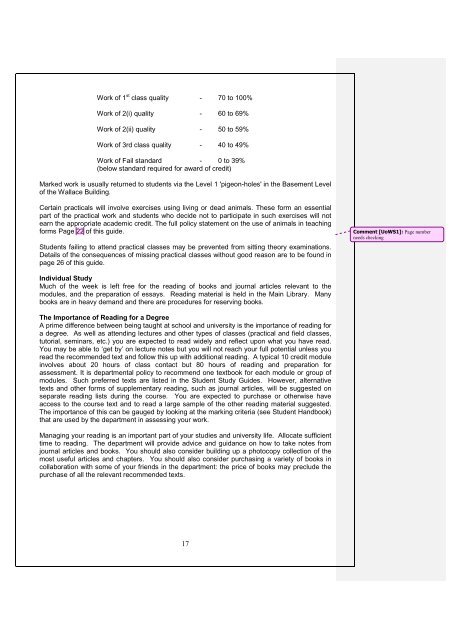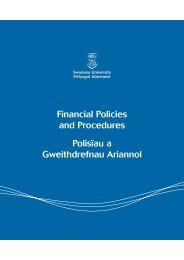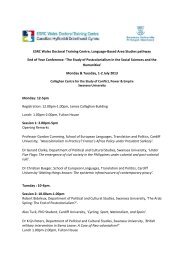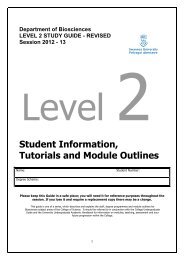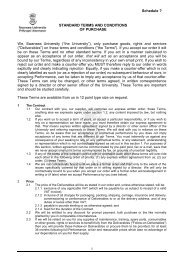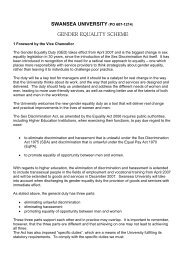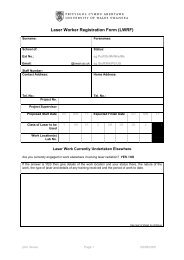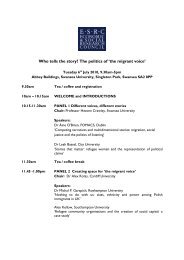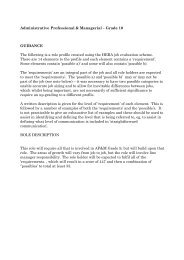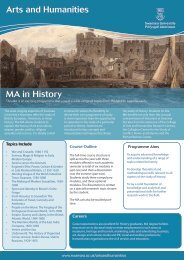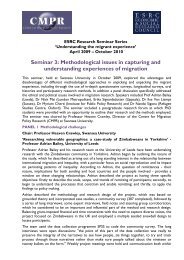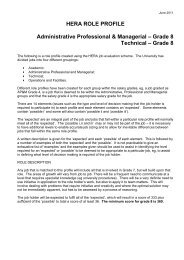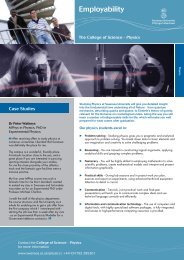Level 0 Study Guide 2012-13 Biosciencex - Swansea University
Level 0 Study Guide 2012-13 Biosciencex - Swansea University
Level 0 Study Guide 2012-13 Biosciencex - Swansea University
Create successful ePaper yourself
Turn your PDF publications into a flip-book with our unique Google optimized e-Paper software.
Work of 1 st class quality - 70 to 100%<br />
Work of 2(i) quality - 60 to 69%<br />
Work of 2(ii) quality - 50 to 59%<br />
Work of 3rd class quality - 40 to 49%<br />
Work of Fail standard - 0 to 39%<br />
(below standard required for award of credit)<br />
Marked work is usually returned to students via the <strong>Level</strong> 1 'pigeon-holes' in the Basement <strong>Level</strong><br />
of the Wallace Building.<br />
Certain practicals will involve exercises using living or dead animals. These form an essential<br />
part of the practical work and students who decide not to participate in such exercises will not<br />
earn the appropriate academic credit. The full policy statement on the use of animals in teaching<br />
forms Page 22 of this guide.<br />
Students failing to attend practical classes may be prevented from sitting theory examinations.<br />
Details of the consequences of missing practical classes without good reason are to be found in<br />
page 26 of this guide.<br />
Comment [UoWS1]: Page number<br />
needs checking<br />
Individual <strong>Study</strong><br />
Much of the week is left free for the reading of books and journal articles relevant to the<br />
modules, and the preparation of essays. Reading material is held in the Main Library. Many<br />
books are in heavy demand and there are procedures for reserving books.<br />
The Importance of Reading for a Degree<br />
A prime difference between being taught at school and university is the importance of reading for<br />
a degree. As well as attending lectures and other types of classes (practical and field classes,<br />
tutorial, seminars, etc.) you are expected to read widely and reflect upon what you have read.<br />
You may be able to ‘get by’ on lecture notes but you will not reach your full potential unless you<br />
read the recommended text and follow this up with additional reading. A typical 10 credit module<br />
involves about 20 hours of class contact but 80 hours of reading and preparation for<br />
assessment. It is departmental policy to recommend one textbook for each module or group of<br />
modules. Such preferred texts are listed in the Student <strong>Study</strong> <strong>Guide</strong>s. However, alternative<br />
texts and other forms of supplementary reading, such as journal articles, will be suggested on<br />
separate reading lists during the course. You are expected to purchase or otherwise have<br />
access to the course text and to read a large sample of the other reading material suggested.<br />
The importance of this can be gauged by looking at the marking criteria (see Student Handbook)<br />
that are used by the department in assessing your work.<br />
Managing your reading is an important part of your studies and university life. Allocate sufficient<br />
time to reading. The department will provide advice and guidance on how to take notes from<br />
journal articles and books. You should also consider building up a photocopy collection of the<br />
most useful articles and chapters. You should also consider purchasing a variety of books in<br />
collaboration with some of your friends in the department: the price of books may preclude the<br />
purchase of all the relevant recommended texts.<br />
17


